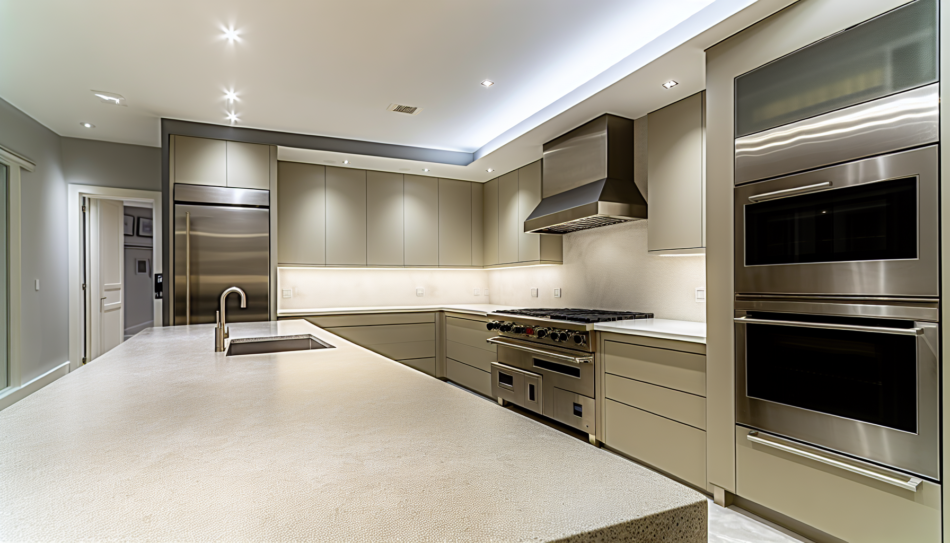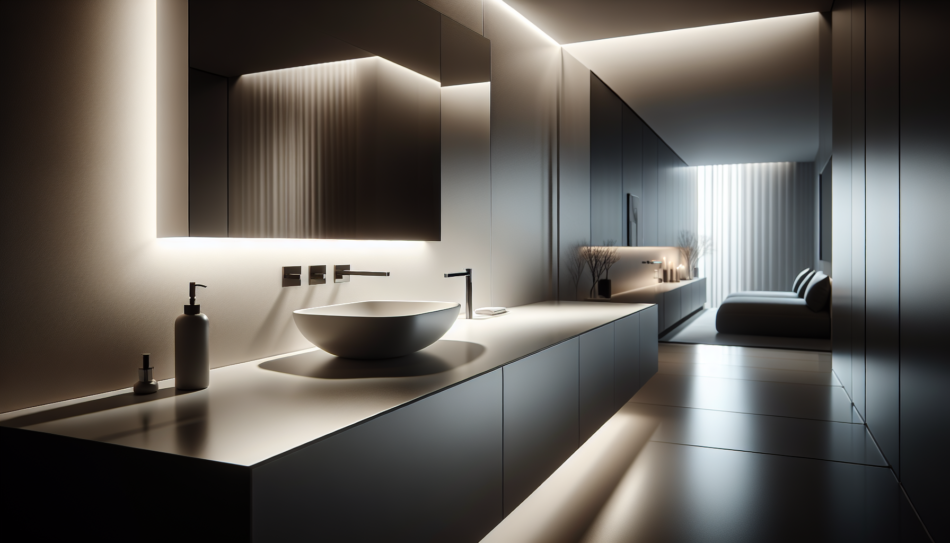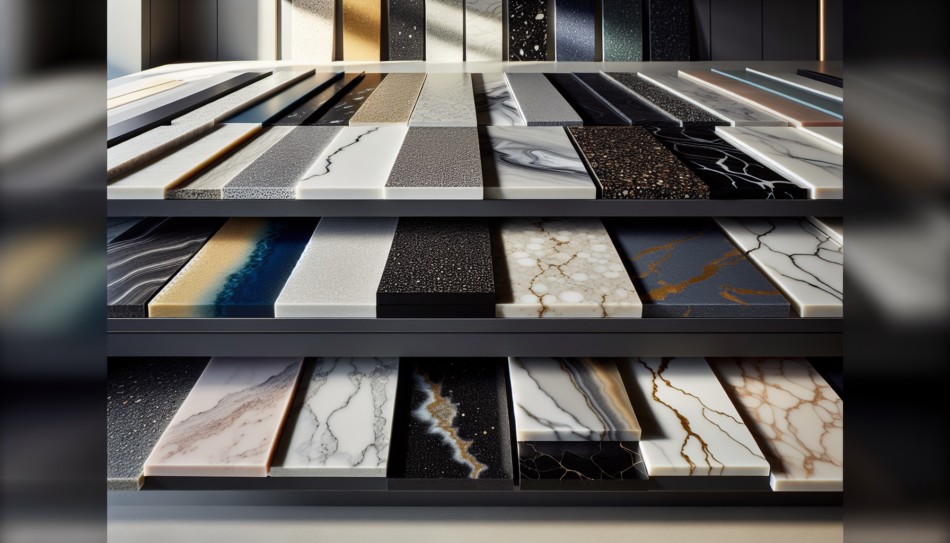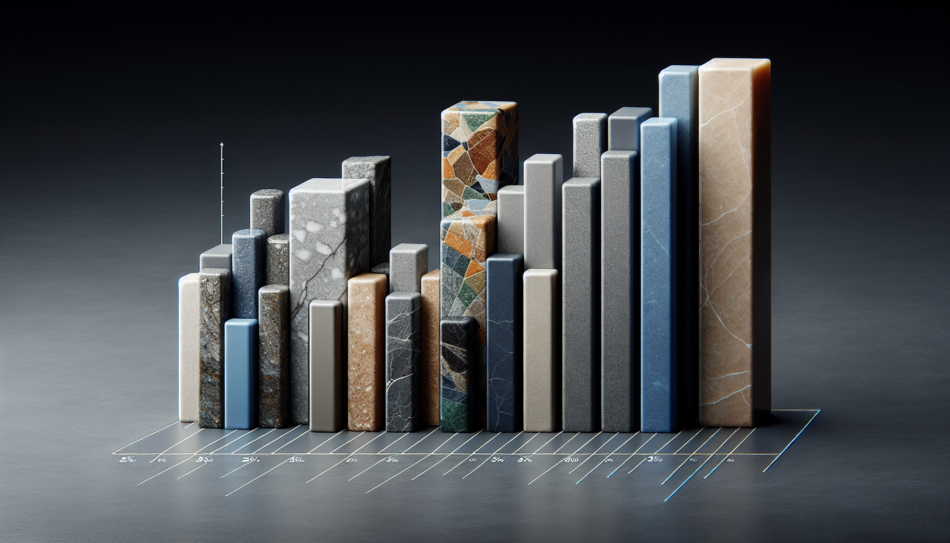Solid Surfacing Countertops: A Smart Guide to Choosing Your Ideal Surface
If you’re on the hunt for the perfect countertop, you’ve likely come across solid surfacing countertops. A popular choice for homeowners worldwide, solid surfacing countertops offer a unique blend of aesthetics, durability, and affordability. But what exactly are they, and what makes them a go-to option over traditional materials like granite or marble? Let’s explore.
Key Takeaways
- Solid surface countertops are a synthetic blend of minerals and resins, offering durability, a non-porous surface, and a wide range of colors and patterns for aesthetic flexibility in home design.
- While solid surface countertops are resistant to scratches and stains and do not require sealing, they are not highly resistant to heat and may suffer damage when exposed to high temperatures or chemicals.
- The cost of solid surface countertops varies between $30 to $60 per square foot, making them a more budget-friendly option compared to natural stone while providing a similar level of style and customization.

Exploring Solid Surface Countertops
Solid surface countertops are a synthetic blend of minerals and resins, offering a plethora of colors and patterns to choose from. This versatility, coupled with their non-porous nature, makes them a sought-after choice for many homeowners, particularly for kitchen countertops. A solid surface countertop is an excellent option for those who value both aesthetics and functionality in their home.
Composition and Material Makeup
Solid surface countertops consist of a mix of:
- Acrylic resin
- Mineral dust, frequently aluminum trihydrate
- Pigments
This combination contributes to their smooth surface, strength, and resilience.
The Manufacturing Process
In the production phase, these materials are mixed and molded into diverse shapes, colors, and patterns. This manufacturing system guarantees unique countertops that can endure temperatures of up to 212 degrees Fahrenheit without warping.
Benefits: Durability and Maintenance
Solid surface countertops, also known as solid surface counters, have several advantages:
- They are hard and impact-resistant, making them durable.
- They are composed of dense acrylic or polyester materials.
- They have a non-porous surface, eliminating the need for sealing or polishing.
- They are easier to maintain than natural stone countertops like granite or marble.
Considerations: Heat Resistance and Cost
When opting for solid surface countertops, their heat resistance is a significant aspect to bear in mind, especially when dealing with high heat. They might get damaged if exposed to heat sources exceeding 320 degrees Fahrenheit.
Furthermore, the overall cost can fluctuate, depending on factors such as brand, color, thickness, and the particular manufacturer or supplier.


Designing with Solid Surface: Style and Aesthetics
Their design flexibility stands out as one of the most attractive features of solid surface countertops. They come in a variety of vibrant colors and patterns, allowing you to achieve a distinctive and customized appearance.
Color Palette and Patterns
Typically, colors and patterns originate from blending acrylic plastic with powdered clay or duplicating designs. The prevailing trends for solid surface countertops encompass:
- white
- grey
- beige
- blue
- terrazzo
- Silver Cloud granite
Edge Profiles and Customization
Customization doesn’t stop at colors and patterns. Solid surface countertops can be further customized through edge profiles, further enhancing their aesthetic appeal.
Solid Surface Sinks and Applications Beyond Countertops
The applications of solid surface materials extend far beyond countertops. They can be fashioned into sinks that seamlessly blend with solid surface worktops.
Integrating Solid Surface Sinks
To integrate solid surface sinks with countertops, the sink and countertop are constructed as a single piece instead of incorporating the sink as an individual component. This creates a seamless appearance, which is aesthetically pleasing and makes cleaning easier.
Versatile Uses Throughout the Home
Various household applications can benefit from the use of solid surface materials, including solid surface material for bathroom countertops, bathroom vanities, window sills, shower pans, walls, shower caddies and even furniture. These solid surfaces provide a durable and versatile option for homeowners.
Choosing Between Solid Surface and Other Countertop Materials
With so many options available, selecting the appropriate countertop material can be quite challenging. Here, we’ll compare solid surface countertops with other popular materials like natural stone and engineered quartz.
Solid Surface vs. Natural Stone
Compared to natural stone countertops like granite and marble, solid surface countertops often present a more cost-effective option. Solid surface countertops are also easier to repair than natural stone countertops. This makes them a popular choice for budget-conscious homeowners looking for high-quality countertops. However, they are considered less durable than natural stone countertops.
Solid Surface vs. Engineered Quartz
Engineered quartz countertops are recognized for their exceptional scratch resistance and heat resistance, outperforming solid surface materials in these aspects. However, solid surface countertops offer more versatility and customization options. Again, solid surface countertops are easier to repair than quartz countertops.

Installation and Long-Term Care
When investing in solid surface countertops, considering installation and long-term care is crucial.
These aspects warrant a more in-depth exploration.
Professional Installation Insights
Although self-installation of solid surface countertops is possible, professional installation is often advised to guarantee the job is done correctly and to achieve a flawless look.
Maintenance Tips
Regularly cleaning solid surface countertops with soap and water is part of their maintenance. To protect the surface from heat, it’s crucial to steer clear of harsh chemicals and employ trivets or heat pads.

Cost Analysis: Investing in Solid Surface Countertops
Without a doubt, cost is a significant consideration when contemplating solid surface countertops. Let’s do a cost analysis to help you decide if this is the right investment for you.
Understanding Pricing
Typical costs for solid surface countertops range between $30 and $60 per square foot, influenced by factors like brand, color, thickness, and overall quality.
Comparing Cost-Effectiveness
In terms of cost-effectiveness, solid surface countertops represent a more economical alternative to natural stone, whilst still offering a durable and stylish option for homeowners.
Summary
Solid surface countertops are a durable, versatile, and cost-effective choice for homeowners. They offer a plethora of design options, easy maintenance, and can be used for various applications beyond countertops.
Frequently Asked Questions
What are the disadvantages of solid surface countertops?
Solid surface countertops can be susceptible to damage from high temperatures and are softer than natural stone, making them vulnerable to cuts, scratches, and damage from harsh chemicals. It's important to consider these factors when choosing a countertop option.
What is a solid surface countertop?
A solid surface countertop is a manufactured product that combines natural elements with resins and pigments, creating a non-porous material that can be installed with minimal seams. It is often made from mineral dust, resins, and pigments, such as quartz.
Are solid surface countertops worth it?
Yes, solid surface countertops are worth it for homeowners on a budget looking for a durable, beautiful, and easy-to-maintain option as an upgrade from laminate.
What is the most durable solid surface counter?
Quartz is the most durable solid surface counter, making it a perfect choice for any kitchen or bathroom. Its mixture of crushed quartz and resin creates diverse appearance options.
What materials are used to make solid surface countertops?
Solid surface countertops are made of a mixture of mineral dust, acrylic, resins, and pigments. This composition gives them their durable and non-porous properties.
